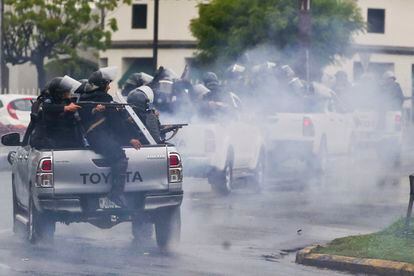Archive image of a police caravan in Managua (Nicaragua). Esteban Felix (AP)
The police patrols of the regime of Daniel Ortega and Rosario Murillo went hunting on the streets of Nicaragua on Wednesday night: they raided homes and detained opponents, peasant activists and journalists in the departments of Managua, Rivas, Matagalpa, Chinandega, Madriz, Estelí, Granada, Jinotega and Chontales.
It was a massive raid that left at least 40 people detained, according to estimates by opposition monitoring agencies.
This is the highest number of arrests recorded in a single day since the 2018 paramilitary operation known as Operation Cleanup.
Anxiety reigned overnight and early this Thursday, when the detainees began to be tried expressly for the alleged crimes of "conspiracy to undermine national integrity and propagation of false news."
According to various sources consulted by EL PAÍS, almost half of the detainees were sent to house arrest with the obligation to sign daily at the nearest police station in their town.
Among the people arrested, María de la Cruz Bermúdez, the mother of Richard Pavón, the first young man killed in the protests of April 2018, stands out. In the city of Rivas, in the south of the country, Octavio Ortega Arana, who was one of the leaders of the protest against the failed Interoceanic Canal project promoted by the Sandinista regime and a Chinese businessman, he was taken away on crutches by the police.
In mid-2022, a leg was amputated due to diabetes problems.
The former correspondent of the newspaper
La Prensa
William Aragón was captured coinciding with the celebration of World Press Freedom Day.
Aragón was sent home to jail and was stripped of his computer and all electronic equipment.
Not all those captured have denounced for fear of reprisals, since after being tried they were threatened by the authorities.
However, the "kidnapping" of the opposition member Ileana Velásquez in Matagalpa became known.
The original citizens of Somoto Danelia Argüello, Xiomara Ruiz, Ruth Espinoza, Socorro Medina and Daniel Moncada were also intercepted and detained as they were leaving the Catholic church known as Tepeyac.
In Chontales, the leader of the Peasant Movement Teresa Mena was kidnapped and taken directly to the El Chipote prison,
"The strategy of dismantling any trace of opposition, however small it may be, continues," Félix Maradiaga, an exiled political prisoner and former presidential candidate, told EL PAÍS.
“They want to eradicate all forms of local resistance, so that any external action against the regime has less impact inside the country.
The regime senses that actions of great international pressure may come, and for this reason they consider it important to stifle any local expression of resistance.
Added to this aspect is the repression of the Catholic Church.
The regime knows that this religious persecution can raise the citizen indignation of a nation with great Catholic feelings, and for this reason they exercise a direct repressive policy against people who, in dictatorial paranoia, could channel that citizen discontent.
New repressive pattern pushes into exile
Opposition organizations have denounced that expressly judging these citizens incurs in a new repressive pattern, which consists of the arrest and subsequent mass accusation of people for crimes such as "undermining national sovereignty" and "propagation of false news", to generate terror and provoke forced exiles.
“There is a mapping of activists, opponents and human rights defenders who are still in the country.
What they are doing is pushing people into exile in a new wave of terror,” explained a source from citizen networks who follows the situation in Nicaragua and who for security reasons asked to remain anonymous.
Many of those forced to house arrest are terrified and consider the idea of leaving Nicaragua, since the danger is latent and the judicial decision can change at any time.
“Due process is violated.
At the time of the hearing they are not allowed to have a lawyer of their choice, they are taken kidnapped before a judicial authority.
That the detainees were transferred in the early hours of the morning before a judge and a massive hearing was held is something we have never seen in the history of Nicaragua,” explained lawyer Yonarqui Martínez, who received more than a dozen complaints the night before.
“In the absence of a fair trial, all the defendant's rights were violated.
It is a new modality to make these massive arrests by different departments, ”she insisted.
After the Ortega-Murillo regime imprisoned and exiled 222 political prisoners last February, the police have executed the “revolving door effect”, which consists of refilling the jails with political prisoners.
The most notable arrests that preceded this raid were those during Holy Week and those in April, the fifth anniversary of the social protests that shook the Sandinista administration.
However, they were arrests carried out in stages and in the whole month there were 21 "kidnappings".
Follow all the international information on
and
, or in
our weekly newsletter
.

